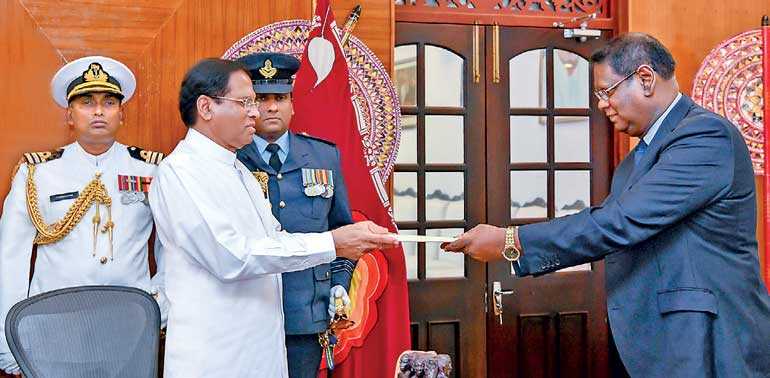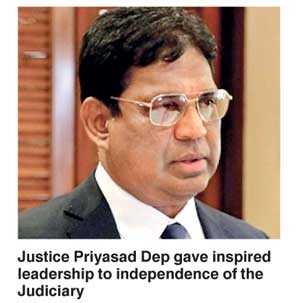Tuesday Feb 24, 2026
Tuesday Feb 24, 2026
Tuesday, 16 October 2018 00:00 - - {{hitsCtrl.values.hits}}

Justice Nalin Perera was sworn in as the 46th Chief Justice of Sri Lanka last week
Cheers to Chief Justice Dep!
We saw Justice Priyasad Dep come and now we see him going into retirement. The fact that a judge cannot get an extension is also sacrosanct; because if that was permitted it could lead to abuse, with judges giving decisions with a view to seeking extension.
Justice Dep gave inspired leadership to the paramount doctrine of independence of the Judiciary. The Judiciary is the pinnacle of good governance that is known as Yahapalanaya. Justice Dep leaves his position with the patriotic and ethical satisfaction of having helped to develop a strong system of good governance in his country. All praise to him!
 Systems
Systems
What Yahapalanaya essentially aims at is to establish systems so that individual politicians and ordinary citizens are impelled to fall in line. Anyone who violates the laws of the land is automatically booked and hooked by the steel hand of the system. You touch a hot oven with the naked hand and you will burn your hand. In the same way, you offend the law and you get into trouble as a matter of course irrespective of your personal standing. This is the system working. In this way, once the system is established the government need not have to depend on well behaved persons to ensure required outcomes.
The sovereignty of the law ensures the sovereignty of the people, which is the foundation of democracy; the Judiciary is the ultimate protector of the law and, by inference, of the people’s sovereignty. What has been accomplished by the 19th Amendment to the Constitution is a system that ensures an independent system for the Judiciary.
Recent history
Tensions may naturally arise between the executive arm of Government and the Judiciary. Sri Lanka did experience such conflicts even before the Mahinda Rajapaksa era. The Executive would desire a Judiciary that can be bent as it wants. Under J.R. Jayawardena we saw that tension in action. During that era we also observed an exemplary Chief Justice, Neville Samarakone, refusing to carry out a JR whim.
On the other hand, Sri Lanka’s recent history has been tragically marred by unholy men in that high position of public trust. We had former Chief Sarath Silva once reportedly saying openly and shamelessly that he could have jailed Mahinda Rajapaksa if he wanted to, over the tsunami episode; but that he saved him. What kind of talk was that?
The CJ is not an emperor who has arbitrary powers to save or punish according to his whim anyone who comes before Court. This statement implies that it is acceptable for the CJ to grant personal favours. Justice Sarath Silva’s subsequent political gymnastics after retirement confirmed his misunderstanding of the role and status of the Chief Justice.
The treatment given by the then President and his Government to another former Chief Justice, Shirani Bandaranayake, is also on record. The assumption of the Rajapaksa regime was that a CJ is there to give judgment in favour of the Government and that if that be not done the Government can browbeat the CJ into retirement. This is what, sadly, happened to Justice Shirani. 
Former Chief Justice Mohan Peiris reportedly did further violence to his sacred role. The media reported that when Mahinda Rajapaksa was defeated in 2015, Justice Peiris had promised to give judgment in favour of the new Government if he were appointed. I haven’t seen Mohan Peiris denying that report.
In this way, concerned and discerning Sri Lankans with a social conscience witnessed before their shocked eyes the open undermining of the doctrine of independence of the Judiciary. This undermining process came in both ways: one by acts of commission and omission by the then President and his Government. Two, by the reciprocative cooperation on the part of the holders of the high office of the Judiciary. Some judges of poor quality were appointed on the grounds of their personal links to the Government. This further enhanced the vicious, mutually-cooperative process.
Ensuring independence in selection
The need to have the crucial appointment of the Chief Justice made as impartially as possible according to merit and not as a personal favour of the President done with expectation of favoured judgments is thus self-evident. This was the whole reason for the provision in the 19th Amendment to the Constitution that required the setting up an independent Constitutional Commission and other independent commissions.
The Constitutional Council plays a pivotal role and it is formed by seven members including the Prime Minister, the Speaker and the Leader of the Opposition. The latter constitute the ex-officio component. Persons of unquestioned integrity have been appointed as the non-ex-officio component of the present Council.
The process that brought in the new Chief Justice, Nalin Perera, is a working illustration of the efficacy of employing independent commissions as embedded in the 19th Amendment to the Constitution. In this instance, the President had to give a nominee only and the Constitutional Council’s consent must be obtained to translate that nomination into an appointment.
This precondition would naturally put the President on the alert to ensure he nominates somebody that may be acceptable. This wasn’t the case in the past, as we know. The President used to appoint anybody according to his will and pleasure. “My car, my petrol!” that was.
Furthermore, a Chief Justice appointed in the Yahapalanaya way would carry credibility among the rest of judges, among the Bar and among the whole community at large.
(The writer can be reached via [email protected].)